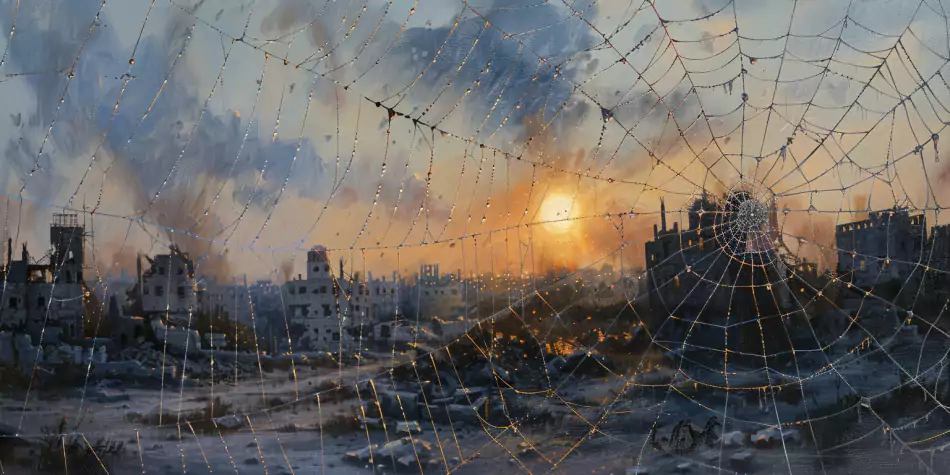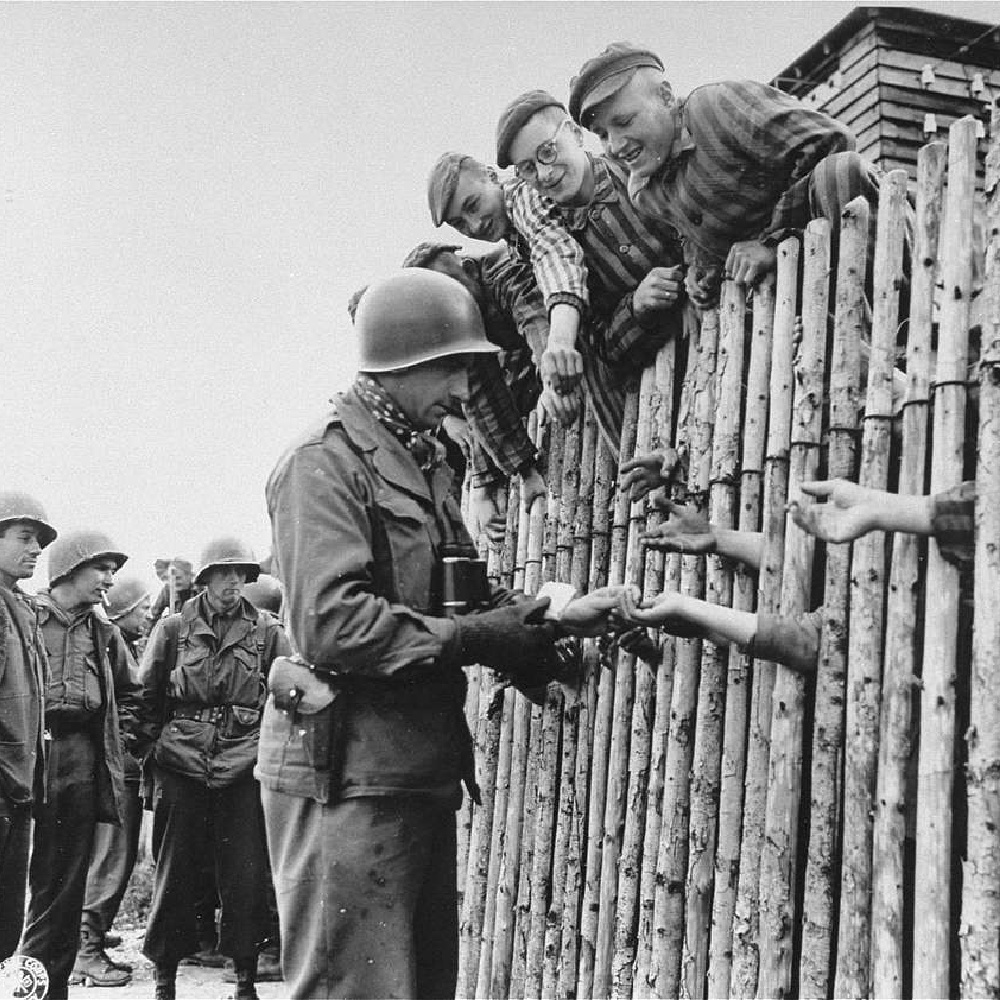The last time I wrote about Israel and Gaza was October 11, 2023. It was just a few days after Hamas’ brutal and barbaric attack on partiers at a peace festival and kibbutzim housing mostly leftist Israelis working for the welfare of Gazans. Over 1,200 were murdered, over 5,000 injured, and hundreds taken hostage.
On October 11th, there were already angry crowds on college campuses or blocking city streets, yelling, “From the river to the sea, Palestine will be free!”. These crowds are still combining in America and other countries, becoming ever more threatening and violent. Anti-semitism is on the rise everywhere. In an article in the Wall Street Journal, Ron E. Hassner reported on a survey of 250 college students across the USA.
Most said they supported the chant, some enthusiastically so (32.8%), and others to a lesser extent (53.2%).
But only 47% of the students who embrace the slogan were able to name the river and the sea. Some of the alternative answers were the Nile and the Euphrates, the Caribbean, the Dead Sea (which is a lake), and the Atlantic. Less than a quarter of these students knew who Yasser Arafat was (12 of them, or more than 10%, thought he was the first prime minister of Israel).
Asked in what decade Israelis and Palestinians had signed the Oslo Accords, more than a quarter of the chant’s supporters claimed that no such peace agreements had ever been signed. There’s no shame in being ignorant, unless one is screaming for the extermination of millions.
The demonstrators don’t seem to realize that the chant calls for the displacement or annihilation of 9.5 million people. True genocide. But it is almost as bad to say, “Israel is doing this for revenge,” “Israel is apartheid,” “Israel is purposely killing as many Gazans as it can,” “Israel is blocking aid to Gaza,” or any sort of pat statement that ignores the befuddling complexity that is the Middle East generally and the Israeli/Palestinian situation specifically. The cultures, behaviors, and beliefs of the Middle East and Israel/Palestine are almost completely unfathomable for Westerners, and the history must be mastered in detail to make sense. Once it makes sense, irony besets us and makes us pace and stammer. Our best experts are pulling their hair out. We can’t relax and think we know because we read the news. Both the left and right views have big problems.
On the Ground Now
Today is March 5, 2024, and Hamas, demanding the exchange of about 100 Israeli hostages for many more Palestinian prisoners, scuttled the newest peace deal by refusing to list the hostages remaining alive, thus prolonging Gazan’s suffering. Hamas could have saved tens of thousands of Gazan lives by accepting a previous offer from the Israeli government—just release the hostages and let your terrorist leadership leave Gaza safely into exile, and the war would end. Now, Bibi Netanyahu is working to find talented, moderate Gazans to organize the delivery of aid in northern Gaza and talented, moderate Gazans to establish a new Gazan government in order to rebuild. The trouble is that moderate Palestinians who attempt to lead tend to be assassinated.
Extremists are determining the ongoing situation. The people who suffer most from extreme Moslem fundamentalism are other Moslems. Years ago (1981), when jihadists assassinated Anwar Sadat, president of Egypt, who had just established detente with Israel, the assassins claimed that it didn’t matter how many people were killed as they tried to get to Sadat. They would all become martyrs for the cause and go to heaven. Does Hamas care how many Gazans suffer and die in this war? One Israeli commander said they were finding a tunnel under every school, hospital, mosque, and many private homes—part of a 350-mile network built with funds that could have made Gaza a Singapore. While Israel has spent billions of dollars to protect its own citizens (the Iron Dome and Iron Beam systems, defensive missiles, shelters, the Home Front Command), Hamas has spent nothing for defensive weapons development, nothing for bomb shelters, nothing on evacuation plans, and nothing on stockpiling food or resources in case of war. Its four leaders outside of Gaza are billionaires. Golda Meir, who was the Prime Minister during the Yom Kippur War, said, “Peace will come when the Arabs love their children more than they hate us.”
We’ve all noticed the intransigence of bordering Arab countries that adamantly refuse to accept Gazan refugees. There is an Egyptian entity that gets Gazans out if they pay enough. Few have been able to gather up the funds. Why have these countries closed their gates? The answer is that these countries have taken in Palestinians in the past. In Jordan, Palestinian extremists tried to assassinate the King and take over the country, then teamed up with Syria and triggered a full-scale war. They were ejected into Syria. The problems they caused there made Syria eject them into Lebanon. In Lebanon, they helped to trigger a years-long civil war. Lebanon is now a failed state. In Egypt, they fomented terrorist attacks. Egypt considers Hamas a dangerous terrorist group, so the border is closed. In Kuwait, they supported invading Iraqis. Kuwait ejected them after Iraq was defeated. In Gaza, Hamas killed at least 600 Fatah supporters. Children are groomed to be martyrs by Hamas, so the rising generation could be as radical as their parents. Meanwhile, moderate, innocent Palestinians suffer.
And then there’s the weather: If you’ve been reading the news, you know displaced Gazans have suffered from hypothermia and a few drenching rain storms. Israel essentially has only two seasons—summer (completely dry and hot) and winter (cold and wet). You get a couple of weeks of spring in March and a couple of weeks of fall in September. On April 15th, it will be summer and very hot, creating a new and awful host of problems for the homeless in Gaza.
The Politics of Onlookers

The woke/left portion of Western leaders and followers tends to view the situation in Israel/Palestine as a simple case of white imperialists oppressing native people of color. Since the Jews of the world were originally from Israel, their DNA just barely differs from the DNA of the Arabs from the same area, even among the Jews whose recent ancestors emigrated to Israel from Europe. So, this supposition is false. Most of these Jewish refugees found shelter in Israel.
Both the left and right views have big problems.
Warping History
Note how the study of students cited at the beginning of this article denied the existence of the Oslo Accords. Through those accords, “Israel accepted the PLO as the representative of the Palestinians, and the PLO renounced terrorism and recognized Israel’s right to exist in peace. [The PLO has been governing the West Bank since then. Abbas is now 88 years old.] Both sides agreed that a Palestinian Authority (PA) would be established and assume governing responsibilities in the West Bank and Gaza Strip over a five-year period. Then, permanent status talks on the issues of borders, refugees, and Jerusalem would be held.” It sounds so good. But Fatah and the PLO are corrupt and inept and can’t possibly take over governing Gaza. In the vacuum left by departing Hamas, new leadership is necessary.
There have been many attempts to create deals for peace, and the Palestinian leadership has rejected nearly all of them because they want it all, as stated in Hamas’ charter, which calls for the genocide of Israel’s population.
Many in the West say that Israel doesn’t have the right to defend itself, and some say it doesn’t have the right to exist. History says they had no choice. No other country would accept Holocaust survivors. No one wanted the Jews. They were destitute and hated in Europe. No country outside Europe would take them as refugees. They were looking for somewhere they could gather and be safe and even considered locations in Africa and Nevada (!). Although the British were leery, they finally agreed that Palestine made sense. After all, that’s where the Jews came from. The Holy Land felt like the logical place to dump them, come what may. Surprisingly, the Jews prospered, made the desert bloom like a rose, bought property legally, and built military might that has thwarted enemies in every war they’ve had to fight. If they had remained poor desert dwellers, the modern landscape would be entirely different. Despite that success, Jews are barely recovering their numbers to pre-Holocaust figures (now at about 15.7 million, with over 8 million in Israel). Note that there are 2 billion Moslems, with about 382 million in the Middle East.
One thing you will hear often is that Palestinians want revenge for the “Nakba.” This refers back to 1948 when about 700,000 local Arabs fled as large Arab armies fought Israel. Israel, not yet being a country, had no standing army, just whatever they could cobble together. Historians squabble over whether the Jews chased out the local Arabs or whether the warring Arab countries encouraged them to leave while they defeated the Jews, the prospect being that they could return to their homes within weeks. According to Israel, the latter is true, but the Jews were happy to take advantage of the situation as they began to triumph. The Palestinians cry, “We will never forget!” meaning, “We will take revenge and get our land back. The Jews often use the same phrase—”We will never forget!” It means, “We will remember the Holocaust and keep all Jews safe.”
Regarding the Nakba, Palestinians leave out of their history the fact that about the same amount of Jews (around the same time) were violently driven out of Arab nations, and most of these Jewish refugees found shelter in Israel. Baghdad used to be 40% Jewish.
Understanding Culture
One thing that really bothers the countries of the Middle East is that Israel is a “Western” country. It has a Western mindset and is capitalistic and democratic. All around Israel, the culture is Oriental—it’s a communal shame culture, where the individual means little, it is humiliating to compromise, and for its extremist groups, revenge is admirable. Culture is extremely powerful, and the West may never understand the reasoning in the Middle East.
Did you see the Gazans rejoicing after their attack on southern Israel? The barbarity of the incursion didn’t matter. The sure and devastating response from Israel didn’t matter. This is a different culture. Culture is extremely powerful, and the West may never understand the reasoning in the Middle East.
Religion is Everything

This is a holy war. Hamas’ attack on Israel was called “Operation Al-Aqsa Flood.” The Al-Aqsa mosque compound sits on the Temple Mount in Jerusalem, which also includes the Dome of the Rock, the oldest standing Islamic structure in the world, built from 688-692 AD. Tradition holds that Mohammed dreamed he ascended from there to heaven, although he never personally visited Jerusalem. The temple site in Jerusalem is Islam’s third holiest site. For Jews, of course, it is THE holy site, the site of Solomon’s Temple, Herod’s Temple, and in the future, the Messiah’s temple.
Israel and Jews had no access to the Temple Mount until it won the Six Day War in 1967. Although Jews rejoiced to have access to their most holy site, they refrained from accessing it (except as infrequent tourists) out of respect for Islam. They left the mount under the management of the Jordanian Arab Waqf. Jews prayed instead at the Western Wall, which holds up the mount and was never part of the temple itself. For the Orthodox, this situation was less awful than it could have been because they feared stepping on the location of the ancient temple’s holy-of-holies—a possible sacrilege. Things have changed in the past few years.
Fringe, ultra-religious Jewish groups have been encouraging their followers to pray openly at the Temple Mount. In 2019, at the end of the month of Ramadan, hundreds of Jewish ultra-nationalists entered the Al-Aqsa mosque compound to celebrate Jerusalem Day—the first time the Israeli authorities had allowed them to do this in 30 years. The mosque’s director bitterly complained that Israeli authorities had broken a promise not to enter during the final days of Ramadan.
In April 2023, amid rumors on social media of Jews heading to the Temple Mount to perform an animal sacrifice, Palestinian rioters illegally barricaded themselves inside the Al-Aqsa Mosque. In response, Israeli police entered the compound and raided the mosque … arresting those inside. These scenes of stone-throwing Palestinians, Jewish zealots, and Israeli police in riot gear are now familiar at the Al-Aqsa mosque compound. Rocket attacks from Hamas have duly followed each incident, along with Palestinian chants in the street: “In spirit and in blood, we will redeem Al-Aqsa.”
Days before the recent attacks, the situation had escalated to a critical point. On October 1, 2023, thousands of ultra-religious Jews began to carry out religious, apparently “provocative” tours of the mosque complex. …
But why are thousands of ultra-religious Israeli Jews suddenly intent on reclaiming the Temple Mount as a place of worship? And why did Hamas name Al-Aqsa as their cassus belli (“occasion for war”), neglecting the security of their own people and instead provoking an all-out, existential war with Israel?
Because Israel now has a Red Heifer.
A perfect red heifer is so rare that the Mishnah says its sacrifice has only happened nine times in Jewish history. The sage Maimonides, a Jewish scholar, believed that the tenth animal would only be found and sacrificed when the Messiah was ready to appear. This is an end-of-times, world-changing event.
Two groups, The Temple Institute and the Temple Mount Faithful (both extreme, orthodox Zionist groups), have for years been preparing for the advent of the Third Temple. They have been creating the implements needed for temple service for quite some time.
[Orthodox groups] have built close ties with, and receive financial assistance from, Christian fundamentalist groups in the United States, who believe a Third Jewish Temple will herald the return of Jesus to Earth and the subsequent Rapture. This influential but subterranean belief helps explain, in part, the United States’ warm relationship with Israel.
Jews don’t agree on who will build the Third Temple, whether it will be the faithful preparing for the coming of the Messiah or the Messiah Himself, but this is an end-of-times, world-changing event.
This spring, that moment for the sacrifice arrives. The sacrifice could take place during Passover or any time through the Feast of Weeks. The important Moslem holiday of Ramadan is also coming soon.
To fundamentalists like Hamas, Jews and Zionism represent no less than the Dajjal (comparable to the Antichrist in Christianity). … This is a holy war fought between the most extreme, militant elements of two ethnoreligious groups to either cause or prevent the End of the World. …This is a war escalated between the most religious, extremist segments of both societies, while innocent civilians, women, and children are forced to suffer.

















